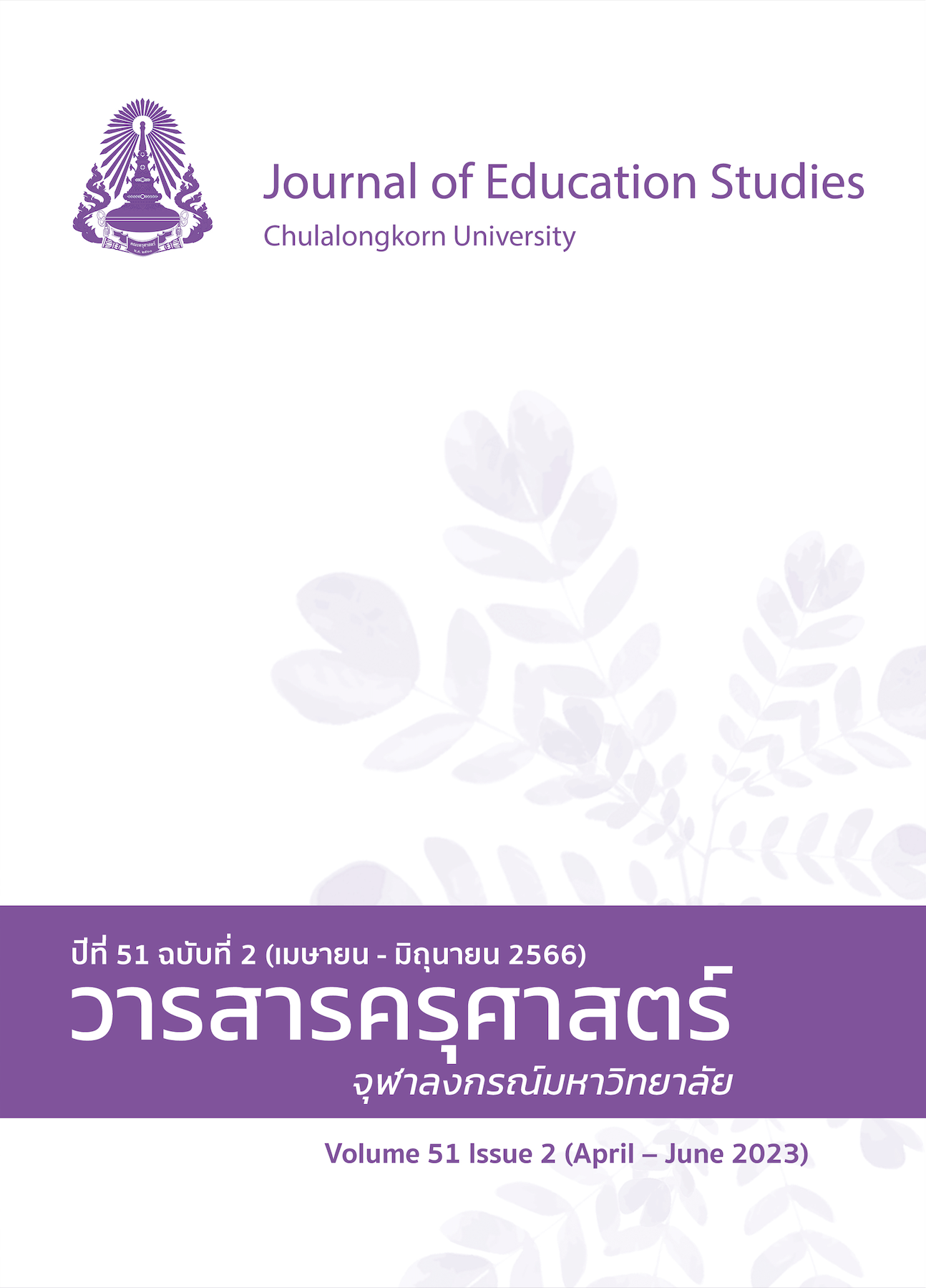The Development of Outcome-Based Training for Secondary School Teachers : Toward Improving Learning Management Design in Promoting Systems Thinking Skills Among Learners
DOI:
https://doi.org/10.14456/educu.2023.11Keywords:
curriculum development, outcome-based, system thinking skillAbstract
The objectives of this research were to 1) develop an outcome-based training curriculum for secondary school teachers aiming to improve learning management for learners, and 2) evaluate the implementation of the training curriculum. The target group comprised 20 secondary school teachers in Bangkok, participating voluntarily with an interest in the training. The research methodology involved 2 phases: 1) developing the outcome-based training curriculum and 2) piloting and evaluating the implementation curriculum. The results of the research were as follows: First, the outcome-based training consists of nine elements: (1) training curriculum principles, (2) training curriculum outcomes, (3) sub-training curriculum learning outcomes, (4) learning activity objectives, (5) content/learning experiences, (6) learning activities, (7) training curriculum time structure, (8) guidelines for training curriculum activities, and (9) assessment of training curriculum outcomes. Second, in terms of the effectiveness of the training curriculum, the ability in the systemic thinking process reached 87.78%, while designing learning lesson plans that promote systemic thinking obtained 91.11%. In addition, it was found that the participants were aware of their teaching roles in enhancing students' systemic thinking skills. They intend a plan to implement the concepts and principles in the future.
References
ภาษาไทย
กรรณิกา วิชัยเนตร. (2557). การสะท้อนคิด: การสอนเพื่อให้นักศึกษาพยาบาลพัฒนาการคิดอย่างมีวิจารณญาณในการฝึก
ปฏิบัติการพยาบาล. วารสารพยาบาลตำรวจ, 6(2), 190-198.
กระทรวงศึกษาธิการ. (2559). หลักสูตรแกนกลางการศึกษาขั้นพื้นฐาน พุทธศักราช 2560. กรุงเทพมหานคร : โรงพิมพ์
ชุมนุมสหกรณ์การเกษตรแห่งประเทศไทย.
ชัยวัฒน์ สุทธิรัตน์. (2561). การพัฒนาหลักสูตร ทฤษฎีสู่การปฏิบัติ. วีพรินท์.
ฐิติมา ญาณะวงษา, สมเกียรติ อินทสิงห์, สุนีย์ เงินยวง, และน้ำผึ้ง อินทะเนตร. (2564). หลักสูตรที่เน้นผลลัพธ์: แนวทางใหม่ สำหรับหลักสูตรอุดมศึกษา. วารสารมนุษยศาสตร์และสังคมศาสตร์ มหาวิทยาลัยราชภัฏพิบูลสงคราม, 15(2),
– 291.
ทิศนา แขมมณี. (2563). ศาสตร์การสอน องค์ความรู้เพื่อการจัดการจัดกระบวนการเรียนรู้ที่มีประสิทธิภาพ.
สำนักพิมพ์จุฬาลงกรณ์มหาวิทยาลัย.
นิยม กิมานุวัฒน์. (2559). การพัฒนารูปแบบการสอนเพื่อพัฒนากระบวนการคิดเชิงระบบสำหรับนักเรียนระดับมัธยมศึกษา
[วิทยานิพนธ์ปริญญาดุษฎีบัณฑิต, มหาวิทยาลัยบูรพา]. http://digital_collect.lib.buu.ac.th/dcms
/files/51810486.pdf
ปิยมาศ บุดดาน้อย และ กัญญารัตน์ โคจร. (2564). การพัฒนากิจกรรมการเรียนรู้ตามทฤษฎีการสร้างความรู้ด้วยตนเองร่วม
กับกลวิธี STAR ที่ส่งเสริมความสามารถในการแก้โจทย์ปัญหาและผลสัมฤทธิ์ทางการเรียนวิชาเคมี เรื่องปริมาณ
สารสัมพันธ์ ของนักเรียนชั้นมัธยมศึกษาปีที่ 4. วารสารมหาวิทยาลัยราชภัฏมหาสารคาม, 15(3), 192 – 202.
ฤทัยรัตน์ ชิดมงคล และ สมยศ ชิดมงคล. (2560). การคิดเชิงระบบ: ประสบการณ์การสอนเพื่อพัฒนาการคิดเชิงระบบ. วารสารครุศาสตร์, 45(2), 209 – 224.
สำนักงานคณะกรรมการการศึกษาขั้นพื้นฐาน. (2564). Competency-based Education. https://cbethailand.com
อัญญารัตน์ สุทัศน์ ณ อยุธยา. (2562). โมเดลการออกแบบการฝึกอบรมอิงกรณีศึกษาออนไลน์เพื่อพัฒนาความสามารถด้านการคิดเชิงระบบ [วิทยานิพนธ์ปริญญาดุษฎีบัณฑิต, จุฬาลงกรณ์มหาวิทยาลัย] Chulalongkorn University Intellectual Repository (CUIR). http://cuir.car.chula.ac.th/handle/123456789/64748
อัสรี สะอีดี. (2561). การพัฒนาหลักสูตรฝึกอบรมเพื่อเสริมสร้างสมรรถนะของครูพลศึกษาในศตวรรษที่ 21 โดยประยุกต์ใช้การอำนวยความสะดวกในการเรียนรู้ร่วมกับการสอนแบบเสริมศักยภาพ [วิทยานิพนธ์ปริญญาดุษฎีบัณฑิต, จุฬาลงกรณ์มหาวิทยาลัย] Chulalongkorn University Intellectual Repository (CUIR). http://cuir.car.chula.ac.th/handle/123456789/63364
อิทธิศักดิ์ ศิริจันทร์. (2560). ผลของการจัดการเรียนรู้ชีววิทยาด้วยรูปแบบผสานรวมที่มีต่อความสามารถในการคิดเชิงระบบและความคงทนในการเรียนรู้ของนักเรียนมัธยมศึกษาตอนปลาย [วิทยานิพนธ์ปริญญามหาบัณฑิต, จุฬาลงกรณ์มหาวิทยาลัย]. Chulalongkorn University Intellectual Repository (CUIR). http://cuir.car.chula.ac.th/handle/123456789/58283
Arantes do Amaral, J. A., & Fregni, F. (2021). Fostering system thinking learning by combining problem-
based learning and simulation-based learning approaches. International Journal of Instruction, 14(3), 1-16. https://doi.org/10.29333/iji.2021.1431a
Forrest, J. (2008). A Response to paper "Systems Thinking" by D. Cabrera et al.: Additional thoughts on
systems thinking. Evaluation and Program Planning, 31(3), 333 – 334. https://doi.org/10.1016/j.evalprogplan.2008.04.008
Groundstroem, F., & Juhola, S. (2021). Using systems thinking and causal loop diagrams to identify
cascading climate change impacts on bioenergy supply systems. Mitigation and Adaptation Strategies for Global Change, 26(7). doi:10.1007/s11027-021-09967-0
Macayan, J. V. (2017). Implementing Outcome-Based Education (OBE) Framework: Implications for
Assessment of Students’ Performance. Educational Measurement and Evaluation Review,
(1), 1 – 10.
Nagarajan, S., & Overton, T. (2019). Promoting systems thinking using project- and problem-based learning.
Journal of Chemical Education, 96(12), 2901-2909. https://doi.org/10.1021/acs.jchemed.9b00358
Shankar, P. R., & Nandy, A. (2014). Student feedback on problem-based learning processes.
The Australasian medical journal, 7(12), 522 – 526. https://doi.org/10.4066/AMJ.2014.2208
Traeber-Burdin, S., & Varga, M. (2022). How does Systems Thinking support the
Understanding of Complex Situations?. 2022 IEEE International Symposium on Systems Engineering (ISSE), 1 – 7. doi: 10.1109/ISSE54508.2022.10005449.
Downloads
Published
How to Cite
Issue
Section
License

This work is licensed under a Creative Commons Attribution-NonCommercial-NoDerivatives 4.0 International License.




